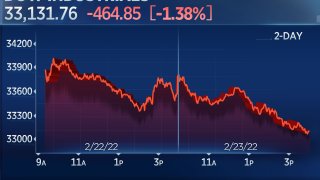
Stocks fell sharply once again Wednesday, as escalating tensions between Russia and Ukraine push the major averages to fresh lows for the year so far.
The S&P 500 fell 1.8% to 4,225.50, closing nearly 12% from its Jan. 3 record close as it slid deeper into correction. The Dow Jones Industrial Average dropped 464.85 points to 33,131.76. The technology-focused Nasdaq Composite lost 2.6% to 13,037.49.
Both the Dow and Nasdaq fell for a fifth straight session, while the S&P 500 notched a four-day losing streak.
Get San Diego local news, weather forecasts, sports and lifestyle stories to your inbox. Sign up for NBC San Diego newsletters.
The Dow and Nasdaq closed below their Jan. 24 intra-day lows on Wednesday. The S&P 500 dipped below its late-January low before closing marginally above it.
Wednesday's decline pushed the Nasdaq closer to bear market territory, as it sits more than 18% from its November closing record.
"Stocks are going to struggle to find direction until financial markets have a clear answer on whether the Russia-Ukraine crisis will have a diplomatic solution or regional warfare," said Edward Moya, senior market analyst with Oanda.
Money Report
Stocks moved broadly lower with reopening plays like airlines and cruise lines in the red, as well as some technology names. Delta Air Lines lost 4.1%, and Tesla was off by 7%. E-commerce giant Amazon fell 3.6%, and Apple dropped 2.6%.
Retailers were a sea of red, with Macy's falling 5.2% and TJX Companies dropping 4.2%. Best Buy lost 2.1%, and Nordstrom fell 3.4%.
Investors have been juggling brewing tensions between Russia and Ukraine. Ukraine warned its citizens against traveling to Russia and to leave the neighboring country, if they are there. Meanwhile, the UK said that it was ready to impose more sanctions on Russia.
The Ukraine Ministry of Digital Transformation said also Wednesday there was another mass DDoS [denial of service] attack on Wednesday that prevented certain entities from accessing government websites, NBC reported.
Meanwhile, the Biden administration announced it will allow sanctions to move forward on the company in charge of building Russia's Nord Stream 2 gas pipeline, following a first tranche of sanctions against Russia Tuesday that targets Russian banks, the country's sovereign debt and three individuals.
"Today, I have directed my administration to impose sanctions on Nord Stream 2 AG and its corporate officers," Biden said in a statement Wednesday. "These steps are another piece of our initial tranche of sanctions in response to Russia's actions in Ukraine."
The VanEck Russia ETF, a U.S.-traded security which invests in top Russian companies, dropped nearly 9.3% on Wednesday.
"While uncertainties remain, our work shows that historically military/crisis events tend to inject volatility into markets and often cause a short-term dip, but stocks tend to eventually rebound unless the event pushes the economy into recession," Eylem Senyuz, senior global macro strategist at Truist, wrote in a note to clients.
"Investor sentiment also suggests the bar for positive surprises is low," Senyuz added.
Investors are also facing concerns about record inflation and the Federal Reserve's monetary policy pivot which could result is rate hikes as soon as next month.
Wall Street is betting that there's a 100% chance of a rate hike at the Federal Reserve's March meeting, according to the CME Group's FedWatch tool.






